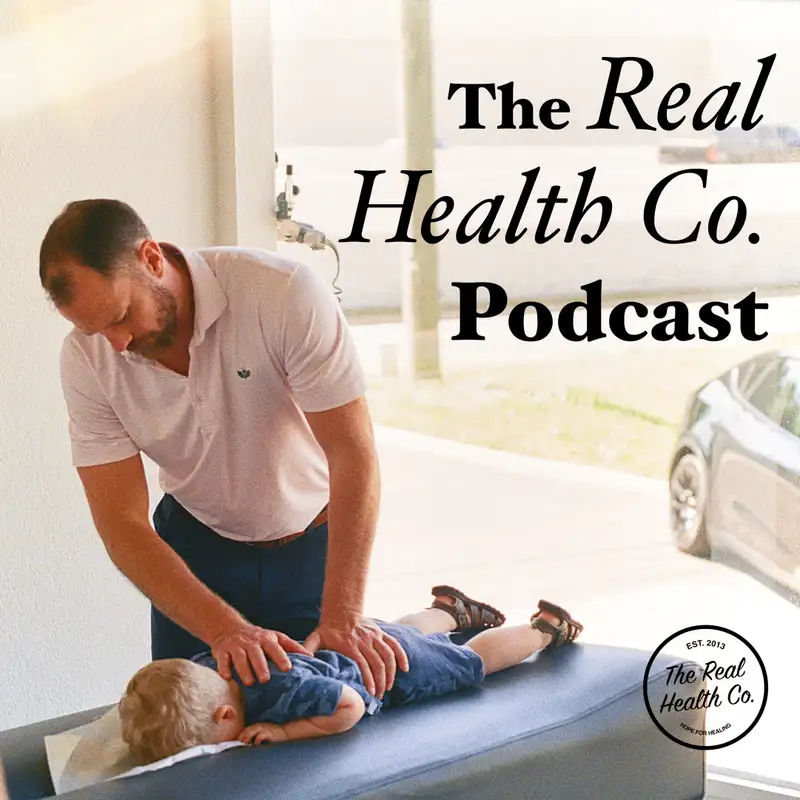 Episode 126
Episode 126
· 10:55
Welcome back to another episode of the Real Health Podcast. We've been having conversations on nutrition all month. And today, my goal is to help you understand how chronic inflammation and autoimmunity are rising and what you can do about it. Specifically, we're gonna focus on a nutrition plan that we use in the office to reverse chronic inflammation and autoimmunity. It's a foundation of so many nutrition plans.
Dr. Barrett:So if you were to ask me, "hey, Doctor. Barrett, what is the single best nutrition plan for chronic inflammation, autoimmunity, brain fog, depression, digestive issues, joint pain," this is gonna be it. We're gonna talk through what we reference as the AIP. This month, keep in mind that we are doing a free InBody assessment in our offices at our west location, which is a body composition evaluation, and at the end of the month, we are having a master class on nutrition 101, which is how to incorporate nutrition to see aesthetic changes. So, lean mass, decrease fat, what do macros look like, how much protein should I be eating.
Dr. Barrett:We're going to be answering those questions in our master class. Make sure you sign up through our linktree on Instagram. So, if you've struggled with joint pain, fatigue, digestive issues, autoimmune symptoms, then this diet may be the nutritional reset that your body needs. What is it called? For short, AIP, for long autoimmune paleo diet.
Dr. Barrett:It's originated from the paleo diet, obviously, but it's stricter and it's more targeted. It's designed to eliminate the most common triggers of inflammation and autoimmunity. When we look at this nutrition plan, it is designed as a temporary elimination with a slow reintroduction of foods. This is not a forever, this is a time based nutrition plan. We start off with elimination, and then we reintroduce over time.
Dr. Barrett:The goals are to heal the gut lining so that we're not leaking food antigens into the bloodstream, creating systemic inflammation, to lower systemic inflammation, and to reduce or maybe even eliminate autoimmune flare ups. So, let's start off with what foods do we need to avoid on the AIP? We know what it's good for, but what am I getting rid of? What am I sacrificing? Well, the big immune triggers are gonna be in three categories.
Dr. Barrett:I'm gonna give them to you in three categories. The first category is immune reactive foods. These foods are the most allergenic. If you were just to start with these and remove these, it would be a massive shift in your inflammation levels. What are these foods?
Dr. Barrett:We talk about them all the time. Gluten, dairy, specifically casein, but dairy, eggs, soy, and corn. Those are your big five. Gluten, dairy, eggs, soy, corn are your big five food allergens to remove. There are also other gut irritants that aren't necessarily immune reactive.
Dr. Barrett:They're just more inflammatory based foods. Grains. So, even gluten free grains, like gluten free oats can be very irritating and inflammatory to the body. Legumes, beans, and peanuts, and lentils. Nightshades, and nuts and seeds.
Dr. Barrett:See, a lot of these foods have what we call antinutrients in them and plant chemicals like phytic acid that increase our inflammation levels. So, the AIP typically removes grains and legumes, nightshades, nuts, and seeds because of how inflammatory they are to the body. Number three, there are certain things that we put in our body that are immune stimulating, and what we're trying to do is actually calm down the immune system. What are those? Alcohol.
Dr. Barrett:Definitely a no go. Any type of NSAID, okay? So, "nonsteroid anti inflammatory drug" destroys the gut lining. Sugar destroys the immune system. And of course, artificial sweeteners.
Dr. Barrett:So, we look at an AIP, these are typically the foods to avoid. What do we eat then? Right? So, are the foods to avoid. What do we eat?
Dr. Barrett:Let me pause a second and just tell you this. If you're driving the car and you're trying to remember all of this, don't pull out your phone and start taking notes. Go to our resources tab at realhealthco.com, and download our AIP diet. We actually have a guide for you on our website right now ready to download. So what do we eat?
Dr. Barrett:These are the healing foods. We wanna add what heals, not just subtract what harms. So what nutrients nutrient dense foods? Again, these are things we talk about all the time. Organic pasture raised meats.
Dr. Barrett:Wild caught fish, right, high in omega three fatty acids. Organ meats like liver, great in fat soluble vitamins like vitamin A and vitamin D. Bone broth is so good for the gut to heal the digestive lining. These are awesome nutrient dense rich foods. We also want to consume some anti inflammatory vegetables.
Dr. Barrett:Dark green leafy vegetables, cruciferous vegetables, broccoli, cauliflower, kale are fantastic as nutrient dense foods that also help reduce oxidative stress in the body. Don't forget fermented foods. So, the AIP will absolutely incorporate sauerkraut and fermented vegetables because of how important they are in our digestive health with enzymes and natural organic acids and natural bacterial loads that are great for the digestive health. We want to incorporate healing starches to our body. What are healing starches?
Dr. Barrett:These are starches that contain insoluble fiber that are fantastic for our digestive system. So like sweet potatoes, yucca, even rice can be incorporated. We look at berries that are low glycemic fruits. We look at apples, and pears, and mango that are like really low anti inflammatory foods. All of these are allowed on the AIP.
Dr. Barrett:And of course, we gotta have healthy fats, right? Avocado and olive oils and coconut oil is great to be consuming for those fats to reduce inflammatory loads and provide the brain with the necessary fuel to heal. Why? Why does this all work? Right?
Dr. Barrett:So when you look at this nutrition plan, you gotta have a why. Like, why am I doing this? So, if you don't have a big enough why, then we'll never accomplish the task at hand, and we'll give up. Two weeks in when it's hard, we'll give up. So, why do we wanna do it?
Dr. Barrett:Because we're trying to reset the immune system, calm down the inflammatory response, and heal the digestive system. Inflammation is often rooted in gut dysfunction and the AIP diet is designed to heal the gut. The primary things of why it works is for leaky gut or intestinal permeability. It's a key driver of autoimmunity where AIP removes these food antigens that cross the blood, or sorry, the gut barrier, get into the blood and cause systemic autoimmune response and even can cause what we call molecular mimicry where these foods then start cross reacting with tissues of the body like your thyroid, like your brain. If you're reacting to dairy with autoimmunity, you could be causing MS in the future, right?
Dr. Barrett:There's an association with Alzheimer's and dementia. The association with Hashimoto's and gluten, for instance. And so, we're removing these food antigens, healing the gut, and then allowing reintroductions to happen at another time. The AIP diet specifically helps calm down a very dominant Th1 immune system which we've talked about in the past and helps regulate the entire immune system as a whole. We see a reduction of inflammation.
Dr. Barrett:We see reduction of CRP levels on labs. It is a massive nutritional plan if we're, again, trying to drive down inflammation levels. So, how do we do it, all right? What does it actually look like? Put plan into action.
Dr. Barrett:Start with a thirty day full elimination phase. Step two. Reintroduce one food at a time every three days. Why three days? Because you can literally have a food reaction that lasts up to three days.
Dr. Barrett:If you consume gluten today, you may feel it. You may feel it tomorrow. You may have a headache tomorrow. You may joint pain in two days. So get a journal and journal everything.
Dr. Barrett:Thirty day elimination and add one food every three days and journal how you felt over the next three days. Did symptoms change? If any symptoms change, whether it's brain, joint, gut, doesn't matter, that food is probably reactive body, keep it out longer. Go to the next food, add it in. How does your body respond?
Dr. Barrett:Tomatoes. "I felt fine." Great. Keep tomatoes in there. Add in another one three days later and keep working through the protocol.
Dr. Barrett:Make sure- this is a guide, make sure you work with a functional medicine practitioner to help you in this journey so that they can properly decipher what you may and may not be reacting to, and how to do it wisely. And just remember, this is not a forever diet. This is a healing phase with a reintroduction phase. The goal of AIP is not forever. It's so that one day, you can live a life of freedom by incorporating all foods back into your nutrition plan in moderation without reaction. Thanks for listening to another episode of the Real Health Podcast.
Dr. Barrett:Our passion is to add value to your healthcare journey. Anything that we do, we want to do it within a community to help as many people as possible. Thanks for listening to episodes of Real Health Podcast. If you could like, if you could subscribe and you can share, it would help our mission to reach as many people with real health that produces real results for real people.

Listen to The Real Health Co. Podcast using one of many popular podcasting apps or directories.